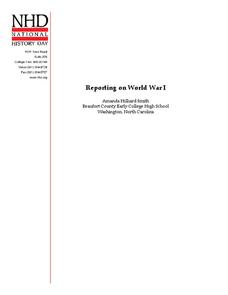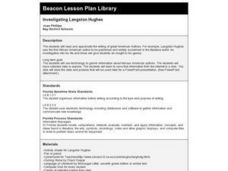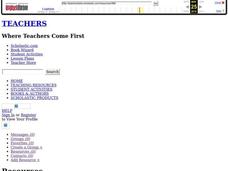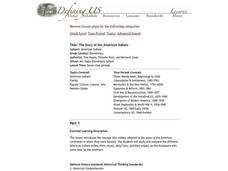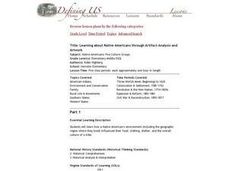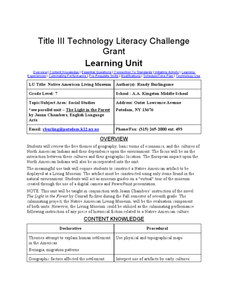Curated OER
Causes of the American Revolution
Students recognize the taxation of the American colonists by the British led to the revolution. They participate in or analyze a performance of an 18th-century song and then discuss its meaning and craft.
Curated OER
African Americans after the Civil War
Students explore the events of Reconstruction after the Civil War. In this US History lesson, students complete several activities and worksheets that reinforce challenges and social upheaval experienced in the South after the Civil War.
PBS
The Symbolism of Sunflower Seeds in Ghost
Ghost by Jason Reynolds is a coming-of-age book that resonates with teenagers who have experienced childhood trauma. Explore the novel with an interactive resource that focuses on the author's use of symbolism, particularly with...
American Chemical Society
Norbert Rillieux, Thermodynamics and Chemical Engineering
The man who invented the earliest examples of chemical engineering was an American-born, French-educated, free man of color before the Civil War, and went on to translate Egyptian hieroglyphics. There is something of interest for almost...
PBS
Henry David Thoreau: Author, Philosopher, and Abolitionist
What would Henry David Thoreau think of life in 21st-Century America? Pupils investigate the abolitionist using primary and secondary materials. They analyze what Thoreau would think of the changes to American lifestyles since the time...
National History Day
Reporting on World War I
Throughout history, newspapers have reported the events of the day as they unfolded. Using primary and secondary sources from World War I, scholars uncover how the American people learned of the events of the War to End All Wars. History...
Teaching Tolerance
In Our Own Words: A Story Book with a Purpose
Academics turn into storytellers in an engaging activity on activism. The activity focuses on promoting social change in local communities with stories. Young historians plan a storybook to target a specific audience and social issue and...
Curated OER
Understanding Points of View
Investigate the importance of author's point of view. Young linguists study primary source documents related to the Treaty of Casco Bay. The first source is authored by the Native American Chiefs, the second by an English...
Curated OER
Navajo Pottery: Beautiful Objects
Young potters make their very own version of the classic Navajo Pottery. With helpful worksheets and applicable cross-curricular activities, the lesson is an enriching way to mold both your clay and the multicultural acceptance of your...
Curated OER
Investigating Langston Hughes
Third graders read and appreciate the writing of great American Authors. use technology to garner information about famous American authors. They have selected sites to explore. The information they save be used for a future Powerpoint.
Channel Islands Film
Dark Water: Lesson Plan 3 - Grades 6-12
After watching the documentary Dark Water about a traditional Chumash ceremony and reading a Chumash origin story, viewers are asked to create a coat of arms and to craft an essay that details a family tradition or their own origin story.
National Constitution Center
Creating Your Own Town Hall Poster
Middle and high schoolers are walking into a world rife with strong political viewpoints and vocal opinions. Help to prepare them for controversial discussions with a lesson in which they choose, research, and learn more about a...
Crafting Freedom
The Self-Empowerment of Harriet Jacobs
In a hands-on learning activity, pupils read about and recreate the experience of Harriet Jacobs, author of one of the most famous slave narratives of all time in which she describes her years of hiding from her master in a confined...
Curated OER
Asian-American History
Students explore aspects of Asian-American culture. In this lesson plan, students use the internet to research American history and the Asian American experience, complete Asian inspired art and read a biography. This lesson includes...
Curated OER
Mark Twain and the American West
Students analyze Mark Twain's "Western" voice. In this literature instructional activity, students read Roughing It by Twain and watch "The West." Students examine Twain's history and compare it to the history of America's developing...
Curated OER
American Indians
Students research early Indian adaptations in this lesson plan. They research the different American Indian tribes. They also research and compare the tribes' rituals, daily lives, and their impact on the Europeans who came later to...
Curated OER
Impact of Westward Expansion on Indigenous Populations
Students study the impact of westward expansion on Native American populations. They create a diorama of a Native American scene, write imaginary letters as a pioneer child reflecting on his/her experiences, and create story sticks that...
Curated OER
What's in a Name? The Use of Native American Images in Sports
Students discuss and analyze the pros and cons of using Native American names and images to represent sports teams. Using primary sources, including position statements from Native American tribes, interviews with school alumni and...
Curated OER
Learning about Native Americans through Artifact Analysis and Artwork
Sixth graders assess how a Native American's environment and the geographic region where they lived influenced their food, clothing, shelter and the overall culture of a tribe. They study the impact of conservation, family, rural life,...
Curated OER
A River, Dead or Alive: Native Americans and European Colonists' Treatment of a River
Students write an expository paragraph about the uses of the Nashua River for the Native Americans and the European Colonists. In this river uses lesson plan, students determine the causes and effects of both parties using the river.
Curated OER
The First North Americans
Students identify and interpret the different North American Indian groups, by region, and the type and impact of their interaction with Europeans.
Then they complete an overview of one main Native American group during the age of...
Curated OER
Turning Points in the American Revolution
Fifth graders examine the causes and effects of the American Revolution. In groups, they make a portfolio page and write a response to the Proclamation of 1763. They also make a timeline of the events of the Boston Massacre and answer...
National Endowment for the Humanities
The Argument of the Declaration of Independence
When in the course of a course on historic American events, it becomes necessary for learners to examine, with decent respect, the Declaration of Independence, it becomes evident that there are six separate and equal parts of that...
Curated OER
Native American Living Museum
Seventh graders complete a unit of lessons on Native Americans. They analyze Native American cultures, create a Native American artifact for a Living Museum, and develop a tour of the museum using a digital camera and a Powerpoint...







